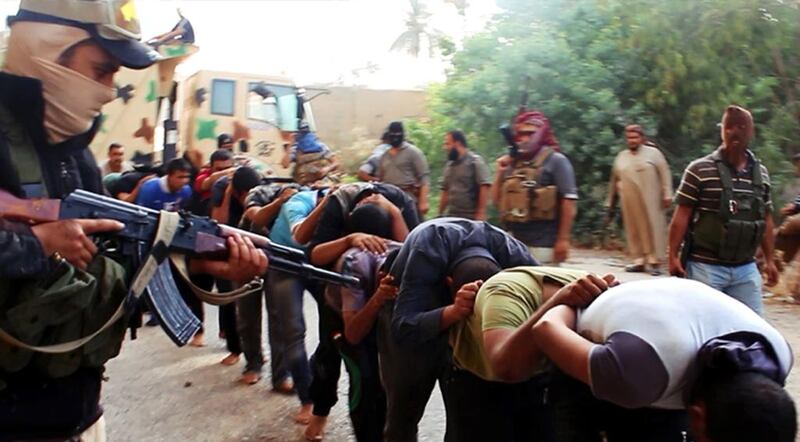Click to trace the militants' footsteps
BAGHDAD // Islamist militants published photos online yesterday that appear to show them murdering dozens of captured Iraqi government troops.
The apparent mass shootings come as Baghdad said it had “regained the initiative” against the militants, who have seized vast swathes of northern Iraq.
ISIL, the Islamic State of Iraq and the Levant, and its allies have overrun one province and parts of three more since they launched their offensive last week.
The pictures on a militant website appear to show masked ISIL fighters loading the captives on to flatbed lorries before forcing them to lie face down in a shallow ditch with their arms tied behind their backs. The final images appear to show the bodies of the captives soaked in blood after being shot.
Captions say the killings were to avenge the death of an ISIL commander, Abdul Rahman Al Beilawy, shortly before the Al Qaeda splinter group captured Mosul and Tikrit in a lightning offensive.
Iraq’s top military spokesman, Lt Gen Qassim Al Moussawi, said the photos were authentic, and there had been mass murder of captured Iraqi soldiers in areas held by ISIL.
Most of the soldiers in the pictures are in civilian clothes. Some have military uniforms underneath, indicating they may have hastily disguised themselves as civilians to try to escape.
Many soldiers and policemen left their uniforms and equipment behind as the militants swept into Mosul, Tikrit and surrounding areas.
The captions did not provide a date or location, but Gen Al Moussawi said the killings took place in Salahuddin province, the capital of which is Tikrit.
Security forces have generally performed poorly, with some abandoning their vehicles and positions and discarding their uniforms, though they seem to have begun to recover from the initial onslaught and have started to regain ground.
Iraqi commanders have said their forces were now starting to push the militants back, and that soldiers had recaptured two towns north of Baghdad, with a spokesman announcing that Iraqi security personnel had killed 279 “terrorists” in the past 24 hours.
Iraqi officials however often announce large militant tolls, with no way of independent verification, and downplay their own casualties.
Iraqi prime minister Nouri Al Maliki’s security spokesman, Lieutenant General Qassem Atta, also said during a televised news conference that Baghdad had “regained the initiative”.
Baghdad’s forces will be joined by a flood of volunteers, urged on by a call to arms from powerful Shiite cleric Grand Ayatollah Ali Al Sistani.
Iran meanwhile warned on Sunday that “any foreign military intervention in Iraq” would only complicate the crisis.
“Iraq has the capacity and necessary preparations for the fight against terrorism and extremism,” foreign ministry spokeswoman Marzieh Afkham was quoted as saying by the ISNA news agency.
Iranian president Hassan Rouhani said a day earlier that Iran had not been asked for help by its neighbour.
But in surprise comments Mr Rouhani added that Iran may “think about” co-operating with its arch-foe the United States to fight the militants in Iraq, despite the lack of diplomatic relations between Tehran and Washington for more than three decades.
Lakhdar Brahimi, the former UN and Arab League envoy to Syria, said the international community’s neglect of the conflict in neighbouring Syria had precipitated the crisis in Iraq.
“It is a well known rule: a conflict of this kind (in Syria) cannot stay confined within the borders of one country,” Mr Brahimi said.
The international community “unfortunately neglected the Syrian problem and did not help to resolve it. This is the result,” said Mr Brahimi.
Also on Sunday, conflict monitor the Syrian Observatory for Human Rights, said Syria’s army has been pounding for 24 hours major ISIL bases in coordination with the Baghdad government.
“The regime air force has been pounding ISIL’s bases, including those in the northern province of Raqa and Hasakeh in the north-east,” which borders Iraq, said the Britain-based group.
The regime of president Bashar Al Assad was responding to the fact that ISIL “brought into Syria heavy weapons including tanks” captured from the Iraqi army.
In Raqa, the air force bombed the area surrounding ISIL’s main headquarters in Syria, as well as the group’s religious courts, said the Observatory, adding there were no reported casualties.
On Saturday, the regime also bombarded ISIL’s headquarters at Shaddadi in Hasakeh, home to a frontier crossing from Iraq that is under the militants’ control.
Observatory director Rami Abdel Rahman said the strikes were the regime’s most “intense” against ISIL, and that they were being carried out “in coordination with the Iraqi authorities”.
* Associated Press and Agence France-Presse





